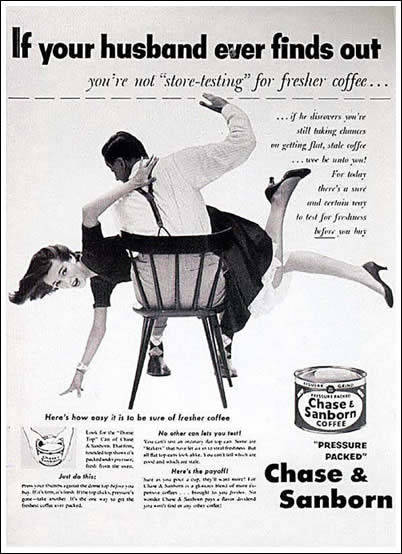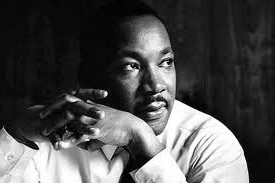The headlines make it easy to believe that we live in a country where violence, poverty, and hate crimes are all on the rise, leading to some inexorable climax. Yet a careful review of the numbers even over my half century of life indicates that it just ain't so.
The America some of us were born into had some pretty bad things that have improved or been abolished since the year I was born.
There was no Medicare or Medicaid; the elderly and poor had to choose between food and medicine and often lacked both. We had thousands of nuclear weapons and seemed prepared to use them; MAD (mutually assured destruction) was not a joke but an official government policy. Communists were believed to be everywhere - making our movies; teaching our kids; providing healthcare; and only patriotic organizations such as the John Birch Society could ferret them out. We were so obsessed with communism that we almost started a nuclear war over missile shipments to Cuba, and were about to begin a horrible, protracted decade of fighting in a tiny country few Americans had heard of but in which over 58 thousand would die, along with millions of Vietnamese.

Neighborhoods and marriages were split along religious lines - Protestant versus Catholics. If you were Jewish or Muslim, you need not apply (to country clubs, many schools, or even elite universities). Marriage between an African American and a white person was illegal in most states. Not only was gay marriage not on anyone's radar screen, most states had enforced sodomy laws and it was still a scandal to be considered homosexual, and cause for dismissal or even incarceration. Psychiatrists and psychologists officially labeled homosexuality a pathological condition.

Making jokes about women, people of color, immigrants, Jews, homosexuals, and people with cognitive impairments was mainstream and widely condoned. Homophobia was not a word and would not have been understood as something bad.
Adult working women were commonly referred to as "girls" or "my girl" by her boss (who was always a man). In some jobs, it was still expected that a woman remain single. If she got engaged or pregnant (or both), she was expected to resign since her husband would support her.

Violence against women was largely condoned - advertisements featured men spanking their wives and when Ralph threatened to beat his wife Alice on the Honeymooners it elicited laughter, not stunned silence.

Misogyny and romanticizing of tobacco all in one.
Children did not wear seat belts. Most cars did not have seat belts installed. There were no air bags, anti-lock brakes, or even shatter-proof windshields.
The average car got about the same mileage as a Hummer today and emitted far more CO2 per mile driven. There was no such thing as recycling or sustainability. Green was still only a color, not a political movement or way of life. Plastic was considered a life-altering miracle product and asbestos was a great insulator.
Cigarettes were fashionable and even healthy. Your doctor was likely to smoke and physicians endorsed certain brands of cigarettes.
 A bit before my time, but perhaps some old waiting room magazines might have contained this ad.
A bit before my time, but perhaps some old waiting room magazines might have contained this ad.
The homicide rate was 4.9 (per 100,000 per year) the year I was born, but was on its way to more than double to a peak of 10.2 in 1980 where it remained for over a decade (it was 9.5 in as recently as 1993) before plunging to its current 4.7, lower than when I was born.
Life expectancy at birth was 73.7 years when I was born; it is now over 81 years. Not only are more people living longer, they are living far more functional, pain-free lives thanks to extraordinary advances in medicine, surgery, stroke prevention, and arthritis treatment.
There was no such thing as a hate crime. A president had just been murdered and in a few years his brother would be murdered too.
The n word was not only widely used, in many parts of the country it was the default way to refer to a black person (along with "boy"). The KKK was mainstream and had infiltrated many police departments, police municipalities, and churches.


Martin Luther King who is now a hero was still a deeply controversial figure, hated in many parts of the country, and was to be dismissed even by President Johnson, annoyed that MLK continued to denounce the growing war in Vietnam as part of a cycle of poverty, racism, and violence. Even many well-intentioned Americans felt that the civil rights movement should have ended with Civil Rights legislation; shouldn't black folks should be grateful Jim Crow was dead? He would be murdered too when I was starting school. It would take almost a quarter century from his death to get Arizona to approve Martin Luther King Day as an official holiday in 1992, following a tourist boycott.
So, yes, we have problems to solve, but let's not forget that we are making progress. It it seems sometimes that we aren't it might well be a sign, paradoxically enough, of our progress. Cutting the homicide rate in half from its peak isn't enough. Americans seemed complacent about having a slightly higher homicide rate when I was born than they do now, so our bar for measuring violence and determining what an acceptable level of violence is has been lowered - our standards have surged. And in 1964, when a disproportionate number of the victims of violence were - as is true today - people of color, white America generally didn't see that as a problem. We do now.
I hope we see many things as problems that our parents and grandparents dismissed or weren't even aware of, but that doesn't mean they weren't problems then or we aren't solving them today.
The America some of us were born into had some pretty bad things that have improved or been abolished since the year I was born.
There was no Medicare or Medicaid; the elderly and poor had to choose between food and medicine and often lacked both. We had thousands of nuclear weapons and seemed prepared to use them; MAD (mutually assured destruction) was not a joke but an official government policy. Communists were believed to be everywhere - making our movies; teaching our kids; providing healthcare; and only patriotic organizations such as the John Birch Society could ferret them out. We were so obsessed with communism that we almost started a nuclear war over missile shipments to Cuba, and were about to begin a horrible, protracted decade of fighting in a tiny country few Americans had heard of but in which over 58 thousand would die, along with millions of Vietnamese.
Neighborhoods and marriages were split along religious lines - Protestant versus Catholics. If you were Jewish or Muslim, you need not apply (to country clubs, many schools, or even elite universities). Marriage between an African American and a white person was illegal in most states. Not only was gay marriage not on anyone's radar screen, most states had enforced sodomy laws and it was still a scandal to be considered homosexual, and cause for dismissal or even incarceration. Psychiatrists and psychologists officially labeled homosexuality a pathological condition.

There was a time when gay meant only jolly and other words for homosexual were nasty and hate-filled.
Making jokes about women, people of color, immigrants, Jews, homosexuals, and people with cognitive impairments was mainstream and widely condoned. Homophobia was not a word and would not have been understood as something bad.
Adult working women were commonly referred to as "girls" or "my girl" by her boss (who was always a man). In some jobs, it was still expected that a woman remain single. If she got engaged or pregnant (or both), she was expected to resign since her husband would support her.

Violence against women was largely condoned - advertisements featured men spanking their wives and when Ralph threatened to beat his wife Alice on the Honeymooners it elicited laughter, not stunned silence.

Misogyny and romanticizing of tobacco all in one.
Children did not wear seat belts. Most cars did not have seat belts installed. There were no air bags, anti-lock brakes, or even shatter-proof windshields.
The average car got about the same mileage as a Hummer today and emitted far more CO2 per mile driven. There was no such thing as recycling or sustainability. Green was still only a color, not a political movement or way of life. Plastic was considered a life-altering miracle product and asbestos was a great insulator.
Cigarettes were fashionable and even healthy. Your doctor was likely to smoke and physicians endorsed certain brands of cigarettes.

The homicide rate was 4.9 (per 100,000 per year) the year I was born, but was on its way to more than double to a peak of 10.2 in 1980 where it remained for over a decade (it was 9.5 in as recently as 1993) before plunging to its current 4.7, lower than when I was born.
Life expectancy at birth was 73.7 years when I was born; it is now over 81 years. Not only are more people living longer, they are living far more functional, pain-free lives thanks to extraordinary advances in medicine, surgery, stroke prevention, and arthritis treatment.
There was no such thing as a hate crime. A president had just been murdered and in a few years his brother would be murdered too.
The n word was not only widely used, in many parts of the country it was the default way to refer to a black person (along with "boy"). The KKK was mainstream and had infiltrated many police departments, police municipalities, and churches.

Note the conflation of integration and communism in this typical KKK billboard (the fact that such a billboard could be erected tells you much about how much times have changed).

Martin Luther King who is now a hero was still a deeply controversial figure, hated in many parts of the country, and was to be dismissed even by President Johnson, annoyed that MLK continued to denounce the growing war in Vietnam as part of a cycle of poverty, racism, and violence. Even many well-intentioned Americans felt that the civil rights movement should have ended with Civil Rights legislation; shouldn't black folks should be grateful Jim Crow was dead? He would be murdered too when I was starting school. It would take almost a quarter century from his death to get Arizona to approve Martin Luther King Day as an official holiday in 1992, following a tourist boycott.
So, yes, we have problems to solve, but let's not forget that we are making progress. It it seems sometimes that we aren't it might well be a sign, paradoxically enough, of our progress. Cutting the homicide rate in half from its peak isn't enough. Americans seemed complacent about having a slightly higher homicide rate when I was born than they do now, so our bar for measuring violence and determining what an acceptable level of violence is has been lowered - our standards have surged. And in 1964, when a disproportionate number of the victims of violence were - as is true today - people of color, white America generally didn't see that as a problem. We do now.
I hope we see many things as problems that our parents and grandparents dismissed or weren't even aware of, but that doesn't mean they weren't problems then or we aren't solving them today.